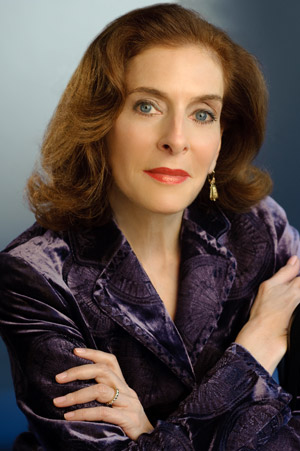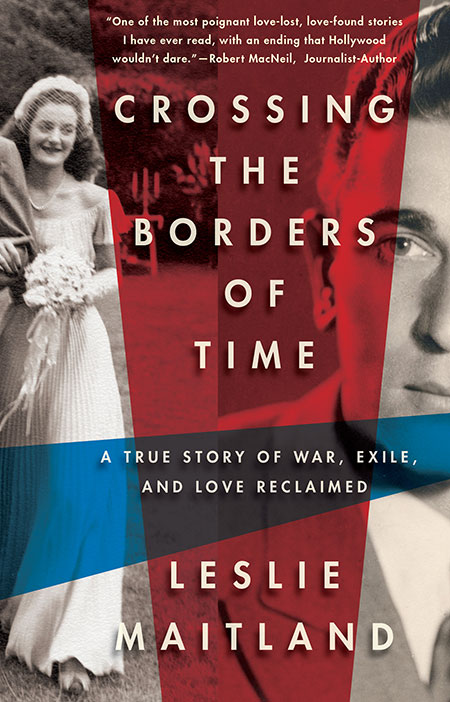Annette Gendler’s interview with Leslie Maitland was one of the Washington Independent Review of Books’s top posts for March.
Continue reading...Radio Centreville’s Jewish Digest, Montreal, February 2
Listen to an interview with Leslie Maitland on the Montreal station Radio Centreville. This interview originally aired on Jewish Digest, Saturday, February 2.
My Mother’s Fearsome Number: Remembering the Holocaust on January 27

On January 27, 1945, Soviet troops liberated the Nazi concentration camp of Auschwitz and its last 7,000 feeble, ill, or dying prisoners. Tens of thousands of others had been forced on death marches in preceding weeks, as the S.S. furiously tried to empty the camp before the Allies discovered the unimaginable cruelty that had reigned within its gates. By then, more than a million captives had been murdered there. Sixty years later, the United Nations would designate January 27 to serve annually as International Holocaust Remembrance Day.
In Israel, however, as in most Jewish communities, the memorial occasion is more widely observed on Yom HaShoah, which occurs a week after the end of Passover and is linked to the anniversary of the Warsaw Ghetto uprising. Its precise yet variable date each spring falls on the 27th day of the month of Nissan, as determined by the lunar, Hebrew calendar.
Curiously, these two dates add to a long list of other pivotal events that happened on the 27th day of different months and attracted my attention as I researched World War II and the dire fate of European Jewry. Having embarked upon these studies for my book – Crossing the Borders of Time – about my mother’s family and their last-minute escape from Nazi-dominated France, I could not help but notice the recurrence of the number 27 throughout the history that was my focus. Why? Because while my mother is in every other respect a person devoid of superstition, a woman with little zeal for anything that smacks of mysticism or occult meanings, she has always harbored a dread fear of the number 27. It has seemed as if she thought that avoiding tragedy on the 27th might guarantee that every other day would be a good one.
Mom traces her targeted arithmophobia back to childhood. She claims that it was sparked by overhearing her mother denounce the number 27 as inherently ill omened, being the date that my great-grandfather, much beloved and far too young, died in Germany in 1913. In consequence of his early death, my mother never knew him. Yet so pervasive has been her fear that she actually pleaded with me to “hold on until midnight” when, years ago, I went into labor with my own daughter on a blessed July 27th in the early afternoon.
Given her experience in the Holocaust with the collective threat of lurking danger, my mother seizes on precautionary action to offer her some feeling of control. And so, ever wary of numerically induced disaster, she once fixedly refused to take her seat in a crowded airplane until my father found sympathetic fellow passengers willing to trade their “safer” seats for my parents’ 27A and B.
“You see those people seated in the 27th row?” Dad the rationalist pointed drily to the other couple, as the plane to California lifted from the runway. “I should warn you – if they go down, we go down also.”
Sensitized by a lifetime of such moments, I was alert to encountering the number as I delved into my mother’s story. The date, for instance, that France became the first European country to offer Jews full citizenship: September 27, 1791. The date the collaborationist Vichy government made it permissible to print racist attacks against Jews in the French press: August 27, 1940. The date that Germany signed a Tripartite Pact with Italy and Japan that aimed to keep America from joining in the war: September 27, 1940. That same day, the Nazis imposed the first anti-Jewish ordinance in the northern two-thirds of defeated France that the armistice permitted them to occupy with iron rule.
It was March 27, 1942, when the first German transport sent more than a thousand Jews from France to death at Auschwitz in Poland. On July 27, 1944, the Germans moved to crush the French Resistance and, gunning down five patriots, left their bloodied corpses as a warning sprawled upon a Lyon sidewalk. Four months later, on November 27, 1944, British bombers leveled the medieval German town of Freiburg, my mother’s birthplace and her home until her family, stripped of valuables and identity, fled across the Rhine to France.
My account of 27s could easily go on, but I do not permit myself to view them as anything but coincidence. All the same, I recognize that the yearning to consecrate events in memory arises naturally from the human heart. There is value in setting aside a day for Holocaust remembrance, be it the 27th of January or of Nissan: in honoring the millions lost we grant them a measure of immortality and affirm commitment to ensuring that such horrors never occur again. Indeed, as years go by, memorializing must drive action to end mass killings – whether the result of state-sponsored genocide or the carnage wrought by troubled individuals allowed to arm themselves with lethal weapons in their wars against the world.
Only by turning every day into a day of memory can we begin to stem the sort of senseless violence that makes each of us a potential mourner or a victim. Surely, if alerted to the frightful import of a number other than 27, we would find reasons justified by history to record its fatefulness. Twenty blameless children executed in their classrooms in Connecticut. A young woman tortured, raped, and murdered in New Delhi. A man shoved onto the New York City subway tracks to die beneath a speeding train. The randomness of evil supports no explanation. Our efforts to mark its madness in time underline our yearnings to delimit it. But beyond setting dates apart on calendars, we must use our grief about the past to trigger change.
Jewish Book Council “Bookmarks” Crossing the Borders of Time
Click the image to view the 2012 bookmark list of Jewish Book Council recommended titles, including “Crossing the Borders of Time” among ten works of adult non-fiction:
Also, be sure to visit the Jewish Book Month page at the Jewish Book Council website.
“Crossing the Borders of Time” wins “Best Voices of the Year” Award
614 Online Magazine Runs Interview with Leslie
The online magazine of the Hadassah-Brandeis Institute just ran an interview with me based on probing questions by writer and editor-in-chief Michelle Cove. The name of the magazine — 614 — has an interesting origin that Cove explains like this:
“In Judaism there are 613 mitzvot—commandments we Jews are all intended to follow. Some Jews feel these commandments, compiled by Maimonides, must be followed because they come directly from God; others suggest they are simply reasonable acts of justice and compassion intended to help us reach our best, most ethical selves. Either way, it’s an extremely comprehensive list, including everything from eating matzah on Passover and lighting Sabbath candles to giving money to charity and not bearing a grudge. The idea of 614 is not that there is one commandment missing. Rather, it is about the idea there is always room for innovation and exploration.”
Read more on www.614ezine.com
Freiburg Newspapers Focus on Crossing the Borders of Time
Crossing the Borders of Time received some wonderful coverage in Freiburg this summer! First the Freiburger Amtsblatt, the newspaper that the city of Freiburg sends to all households, very graciously devoted a full page to the book. A couple whose son lives in Freiburg brought me the paper when I spoke in July at Barnes & Noble in Bethesda. A small world, indeed. I was so pleased with the story, and only wished Sigmar and Alice could see it! Here’s the link to the paper. Scroll to page 5.
Adding to that, the regional newspaper, The Badische Zeitung, also gave a terrific full page to the book! Their thoughtful account was written by Alexander Preker and was published in August. Both papers ran a lovely array of photos, as well. Many thanks to all involved for this beautiful coverage! The link to the Zeitung piece is here.
The photo here shows Mom and me on our first reporting trip in Freiburg, when I wrote a piece about our journey for The NY Times. Between Mom (L) and me is Karin Hill (a photographer for The NYT in Germany). On the right is Walter Preker, still the mayor’s indefatigable press secretary, though City Hall has changed hands several times.
Meeting Huberta von Voss-Wittig

Huberta von Voss-Wittig, a journalist who is the wife of Germany’s Ambassador to the United Nations, Dr. Peter Wittig, graciously hosted a dinner party in their Manhattan residence to celebrate the publication of Crossing the Borders of Time. It was an extraordinarily meaningful and memorable moment for me to be there as she spoke eloquently about the history evoked in the book. I only wished that my German-born grandparents, Sigmar and Alice Gunzburger, could have been with me to hear her.
My grandparents traced their roots in German soil back through several centuries, and it was with deep regret that they fled their home in Freiburg im. Breisgau in 1938. I know they would have been proud to see Ambassador and Mrs. Wittig celebrate my book, which delves into their German heritage and experience under Hitler.
Ambassador Wittig, who has represented Germany in the United Nations since 2009, earlier both studied and taught as an assistant professor at the University in Freiburg. Huberta von Voss-Wittig attracted public attention this past spring, when she and her British counterpart, Sheila Lyall Grant, released a video calling on Asma al-Assad, wife of Syrian President Bashar al-Assad, to stand up for peace in her country.
Blackstone Audio’s Grover Gardner in conversation with Leslie Maitland
Blackstone Audio, which produced the AudioFile Earphones award-winning version of Crossing the Borders of Time, has posted an interview with Leslie on its blog. Listen to Leslie and Blackstone’s studio director, the renowned narrator Grover Gardner, as they discuss the book and Leslie’s experience narrating her own text. “I think I might have put in more periods and used shorter sentences,” she jokes, “if I’d realized that I was going to read it aloud!”
Listen to the full interview here.
‘Crossing’ wins AudioFile Magazine Earphones Award
Happy to share the news that the audio version of Crossing the Borders of Time won an AudioFile Magazine Earphones Award. It will be announced on their website in July and in their print magazine in the August/September issue. As described on the AudioFile website, the awards are presented to “truly exceptional presentations that excel in all the following criteria:
• Narrative voice and style
• Vocal characterizations
• Appropriateness for the audio format
• Enhancement of the text”
The AudioFile Review:
CROSSING THE BORDERS OF TIME :
A True Story of War, Exile, and Love Reclaimed
Leslie Maitland
Read by Leslie Maitland
Within minutes of pressing “play,” the listener may forget this is a work of nonfiction—so engrossing is its story and so vividly is it told. As the author, Maitland crafts the story of her mother’s life as a young Jewish woman during WWII. Her writing exhibits the detail of a reporter and the narrative skill of a novelist. As the performer, Maitland provides smooth pronunciation of French and German terms, as well as various European accents, and superb pacing. The story is vast in scope, but the blend of facts about the time period and the personal love story between Maitland’s mother and a young Frenchman make the production engrossing. L.B.F. Winner of AudioFile Earphones Award © AudioFile 2012, Portland, Maine [Published: JUNE 2012]









